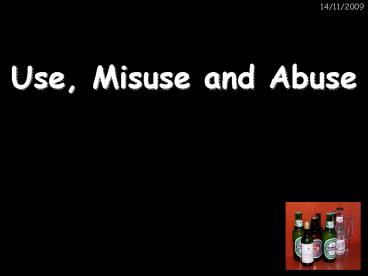Use, Misuse and Abuse - PowerPoint PPT Presentation
1 / 16
Title: Use, Misuse and Abuse
1
Use, Misuse and Abuse
(Edexcel)
2
The effect of drugs
Brain damage
Personality change
Liver damage
Hallucinations
Bad judgement
Addiction
Organ damage
3
Smoking
- Cigarettes contain 3 harmful things
- NICOTINE, which is an ___________ drug that
raises the heart beat, narrows the arteries and
so causes ____ _____ _____. This leads to heart
_________. - TAR, which coats the lining of the _______ making
them less able to take in oxygen. It also
contains carcinogens which cause ______________. - CARBON MONOXIDE, which is a _______ ____ which
joins up with ____ blood cells making them
incapable of transporting _____________ around
the body. In pregnant women it can cause oxygen
deprivation, leading to low birth ______.
Words high blood pressure, oxygen, red,
addictive, disease, poisonous gas, lungs, cancer,
mass
4
Other drugs
Speed up synapse transmissions
Reactions could become faster
Highly strung, leads to exhaustion
Slow down synapse transmissions
May make you drowsy, you shouldnt drive
Highly addictive, make you irritable
Prevent synapse transmissions
May make you drowsy, you shouldnt drive
Side effects include dizziness or itchiness
5
Pathogens
Pathogens are microbes (micro organisms) that can
cause diseases. They can enter the body in a
number of ways
or other natural openings
6
Disease
A disease is any condition where the body isnt
working as it should. This could be caused by a
malfunction in the body (as with diabetes) or it
could be caused by a type of pathogen
Viruses
Bacteria
- 1/1000th mm big
- Living cells (some are harmless)
- Grow very quickly
- Affected by antibiotics
- Examples food poisoning, tetanus, sore throats
- 1/1,000,000th mm big
- Genetic info inside a protein coat
- Not affected by antibiotics
- Release poisons
- Examples colds, flu, polio, chicken pox
7
Fungi
Fungi can also cause unwanted conditions. These
conditions can be treated with anti-fungal
medicine and antibiotics. Some examples (dont
look if youre faint hearted!)
8
Transmitting Diseases
Pathogens can be transmitted in a number of ways
- Horizontal transmission (directly ______ an ill
person) - Vehicle transmission (touching an ill persons
________) - Vertical transmission (mother to ____)
- Airborne (______ in the air)
- Vector-borne (third party, e.g. __________)
Words mosquitoes, belongings, touching, baby,
germs
9
Microbes our defence against them
Our bodies have defence mechanisms against
invading microbes
10
Cleaning our air
Our respiratory system has two types of
specialised cell that help to keep our lungs
clean
1. Mucus is produced and traps dust, bacteria etc
2. The mucus is swept upwards to the mouth by
cilia (cells with tiny hairs)
11
Blood clotting
When we have a cut our blood forms a scab to
prevent microbes entering the wound
Platelets in the blood are exposed to the air
They release an enzyme
The enzyme converts a soluble protein into
insoluble fibrin
The fibrin forms a mesh that traps red blood
cells and a scab forms
12
White blood cells
If microbes enter our body they need to be
neutralised or killed. This is done by WHITE
BLOOD CELLS
- White blood cells do 3 things
- They eat the microbe (these white blood cells are
called phagocytes) - They produce antibodies to neutralise the microbe
(lymphocytes) - The produce antitoxins to neutralise the poisons
produced by microbes (lymphocytes again)
13
Producing antibodies
Youre going down
Step 1 The lymphocyte sees the pathogen
(microbe)
Step 2 The cell produces antibodies to fit the
pathogen
Step 3 The antibodies fit onto the pathogens and
cause them to clump
Step 4 The pathogens are eaten by the white
blood cells
14
Specific antibodies
Antibodies are specific they will neutralise
the microbe they have been made for.
15
Tuberculosis
Tuberculosis is a bacterial disease caused by
mycobacterium tuberculosis. It usually affects
the lungs and the bacteria are spread in coughs
and sneezes.
16
Researching new medicines
Before new drugs can be approved they have to go
through three stages
3. Does it work? People with the illness are
tested on































